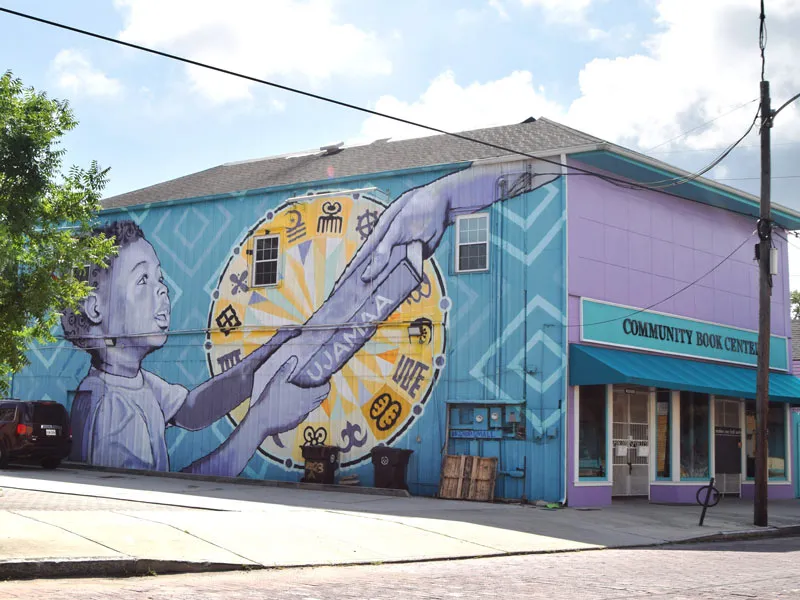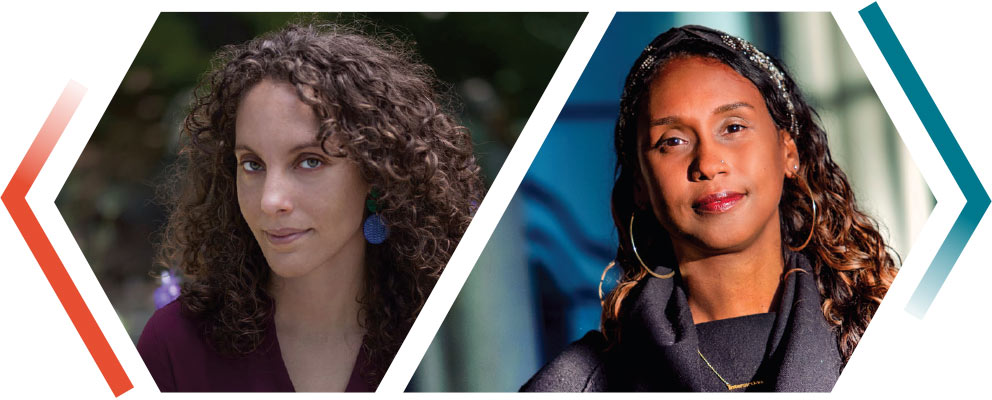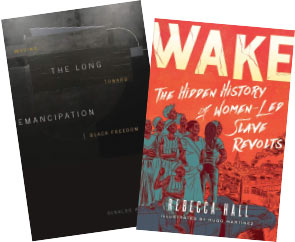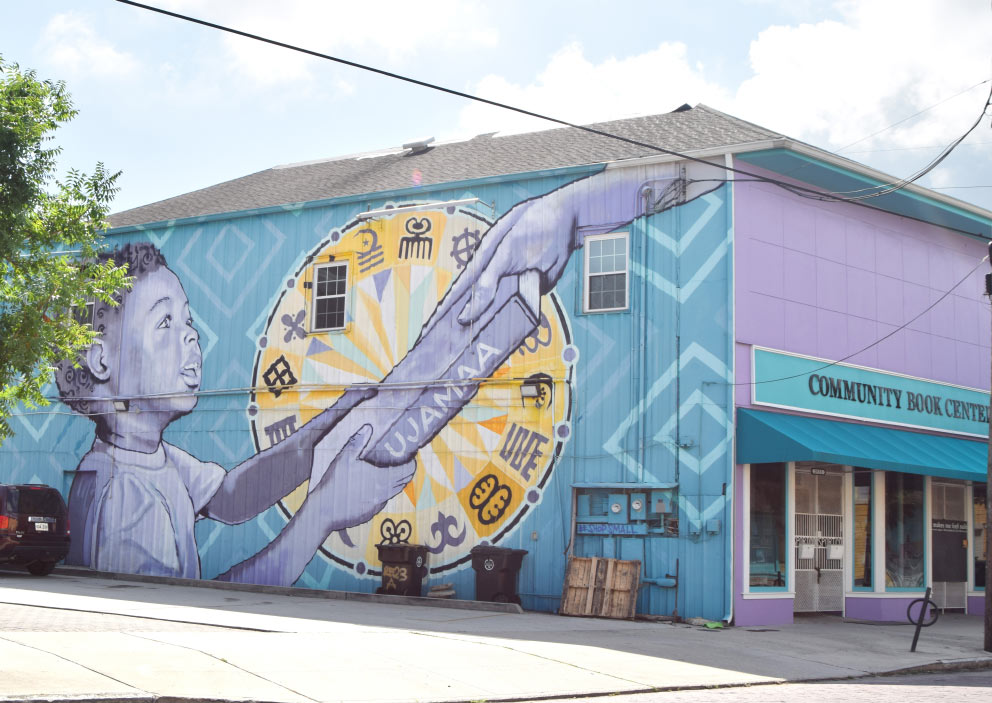

From left, André-Johnson, Postdoctoral Scholar in Africana Studies and Bagneris, Associate Professor and Director of the Africana Studies Program

Each semester, the Black Studies Book Club (BSBC) created by the Africana Studies Program selects a recently published text that has meaningfully shifted the conversation in the discipline, inviting the author to campus for an evening public program followed by a smaller, more intimate “book club meeting” the following day.
Following their Spring 2022 program, Mia L. Bagneris and Cory-Alice André-Johnson shared a conversation about the book club’s first year and future collaborative goals.
One part of “Building a Black Studies Scholarly Community at Tulane and Beyond”—a three-pronged, three-year pilot initiative supported by an Equity, Diversity, and Inclusion Initiative Committee grant—the BSBC aims to build an intergenerational community of diverse participants including city high school students, undergraduates, graduate students, faculty, and staff from Tulane and other local universities, and the larger New Orleans community to engage with Africana texts outside the formality of a classroom setting.
Mia Bagneris (MB): At about quarter to six on Thursday, March 24, I walked into a crowded room in the Lavin-Bernick Center to find you, Cory-Alice, hurriedly putting out extra chairs to accommodate the audience of nearly 80 eager listeners who showed up for the spring semester’s Black Studies Book Club (BSBC) evening program. Thrilled to see so many folks excited for the event—a conversation between Laura Rosanne Adderley, associate professor of history and affiliate faculty of the Africana Studies Program at Tulane, and Dr. Rebecca Hall, author of the graphic narrative Wake: The Hidden History of Women-Led Slave Revolts—I smiled to myself and thought, “Not a bad turnout for the Thursday night before spring break!”
Cory-Alice Andre-Johnson (CAAJ): Because the book club is organized around building community and conversation, the strength of the program is that we don’t just invite a scholar to give a closed lecture to a small group of Tulane folks, but that we try to engage the content of whatever we’re reading with the scholar from a variety of different positions in and out of Tulane and academia more broadly. This allows for more nuanced and in-depth discussions of the texts and their significance in and beyond Black studies.
MB: Yes—and this means also engaging with the broader New Orleans community outside academia. Our partnership with the Community Book Center (CBC), a Black-owned bookstore focusing on Africana content that has served New Orleans since 1983, has also been so important to the success of BSBC’s first year. To help ensure the accessibility of the club, Africana Studies set aside a budget to provide 50-100 free copies of the selected book each semester. We decided early on to order the books through CBC specifically because we knew that owner Vera Warren-Williams and her bookstore constitute New Orleans institutions in and of themselves, and that this collaboration would help spread the word about what we were beyond traditional academic networks.
CAAJ: CBC has really been a phenomenal partner, because the books we’re reading are often already right up their alley. When Dr. Hall was in town, for example, she also did an event there. Working with CBC is also a great opportunity for scholars to do events in New Orleans beyond Tulane, and the community has been so helpful in promoting our events beyond the university, which directly helps build our larger community.
It was designed as a home-based, community service, where I wanted to present to the majority African-American children that I found in the schools books and other educational materials with positive images of themselves.
MB: Through intentional collaboration—with, for example, the Africana Studies Club at New Orleans Math and Charter High School (Sci High), other local universities, and the Community Book Center—the program simultaneously helps to position Tulane as a local hub for the Black studies community and, through fostering this sort of scholarly community, to make the Africana Studies Program a critical part of the pipeline encouraging Black students and other students of color to consider Tulane for their undergraduate and graduate educations.
From the outset, we aimed for depth over breadth in our club partnerships, starting small by developing deep relationships with one or two primary partners and adding more over time. In its inaugural year, our primary focus has been on our relationship with the students of the Africana Studies Club at Sci High, which is directed by Derek Rankins, a Tulane alum who majored in Africana Studies and was this year’s Sci High Teacher of the Year. Since our first program last fall when we welcomed Rinaldo Walcott, author of The Long Emancipation: Moving Toward Black Freedom as the first BSBC Scholar-in-Residence, Mr. Rankins and the Sci High students have been an absolutely integral part of our club success, attending the public talks and bringing infectious enthusiasm to our meeting discussions.
Additionally, a small cohort of our undergraduate majors and minors have become mentors to the high school students, meeting with them in advance of the author visits to discuss the books, and just engaging with them less formally—during lunches and pizza parties—about college life at Tulane.
CAAJ: In both the fall and spring semesters, I was really impressed with the high school students’ readings and interpretation of the texts and the confidence with which they discussed the work with the authors and other members during the book club meeting. When it comes to the mentorship program, I’m always happy to see the mentors provide concrete guidance and advice about navigating everything from the choice to go to college, through admissions, financial aid, managing workloads, and picking majors, but what has been most exciting for me has been watching all the less academic oriented interaction. Just seeing the mentors and high school students connect on all kinds of everyday things makes the college part of things—more accessible.
MB: How do you envision the future growth of Black Studies Book Club partnerships? Where else can we collaborate?
CAAJ: Next year, my focus will be on expanding our collaboration with local Historically Black Colleges and Universities and Loyola. I was able to start that a little this spring, but I would really like to grow those connections further. I’m excited to be able to work with scholars outside Tulane to build meaningful conversations across our institutions and among our faculty, students, and staff. Because New Orleans is home to so many institutions of higher education, we really have a unique opportunity to think with so many more folks than just those within our own campus. I’m hoping BSBC can be a way to foster this inter-institutional academic community.
MB: What’s up next? How can interested readers find out about future BSBC events?
CAAJ: Black Studies Book Club continues next fall with Namwali Serpell’s first novel, The Old Drift. Namwali is an award-winning American and Zambian fiction writer and a Professor of English at Harvard. To keep abreast of dates and other announcements, anyone is welcome to join the BSBC listerve via our website!

Africana Studies
Join the BSBC for upcoming series events, beginning with The Old Drift’s author Namwali Serpell, coming to Tulane for a public lecture and book club-style conversation this fall.

